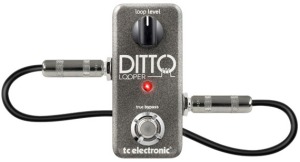You can take the teacher out of the classroom, but you can’t take the classroom out of the teacher. It’s Christmas Vacation as I write this, and I have students-on-the-brain.
Case in point: I’m watching my son enjoy his favorite Christmas present, and it’s got me thinking about teaching again.
It’s the loop pedal’s fault. I didn’t even know what a loop pedal was until I gave Eliot’s Christmas List its due attention. And now, not only do I think it’s the best present we could have bought him, but I think it’s a master teacher.

Huh? How can this little contraption (“THIS was $99?” I exclaimed, unimpressed, upon its arrival) be so miraculous? What, even, is it? The loop pedal is a gadget that allows Eliot to make short recordings with his guitar and then play over those recordings, creating loops or layers of music. And because it’s a pedal, the recording part is “hands-free,” making the process of playing, recording, listening, re-recording and layering seamless.
But is this teacher sacrilege? How can I give an inanimate object teaching kudos, especially since singing the praises of Eliot’s real-life guitar teacher, Craig Friemoth? It was just two Christmases ago, when I wrote about Eliot’s gift to me: he had taken my favorite song at the time and created and played an extended, remixed version of it for me on his guitar. I called it “the best present I’d ever received.” It affected me deeply as a mother and as a teacher as I witnessed Eliot’s growth as a musician and I pondered how to elicit such creativity and engagement in my classroom.
The continuing influence of Craig’s teaching on Eliot’s love of music and growth as a musician can’t be overstated. How, then, can I now bow down to the almighty loop pedal as the ultimate teacher?
Here’s how. This is what he’s doing:
- Eliot & loop pedal at play
- He’s examining the process of music making and the parts of a song.
- He’s perfecting his craft. In any process, there are “cheats” and shortcuts. But a loop recording exposes and amplifies the smallest error. So now there’s an organic motivation for perfection which is fueling extra practice.
- His creativity has exploded. His love of playing classic rock riffs continues, but now it’s mixed with loads of experimentation.
- His aha moments are many. After he plays a loop, adds another and another, I hear all sorts of “ah,” “no” “okay...”wait”... as he’s discovering the interplay of these sounds and then tweaking them for various effects.
- He’s learning the thickness of music. By that I mean he’s experiencing the richness of music as the sum of its parts by deconstructing it and then reconstructing it. It’s like playing in a band while being all the band members.
- Perhaps most importantly, he’s getting that all-important feedback loop that we know is critical to learning. The loop pedal doesn’t lie. It plays back what it hears, making him painfully or ecstatically (whichever the case may be) aware of his abilities, providing feedback and motivation for correction.
Make no mistake: without the guidance of Craig, Eliot wouldn't be ready for any of this. A master teacher enables a student to become his own teacher and prepares him for other “teachers” (human and non-human varieties) he’ll meet along the way.
And so, I end with three pats on the back and a question:
First the back pats:
- One to Mike and I for heeding the Christmas list.
- One to Eliot for creating it.
- One to Craig for making him ready for it.
And now, for the perpetual question:
How can we as educators do this? How can we provide for our students the foundation for life-long learning, the readiness to recognize and leverage all the potential teachers they will meet in life?

No comments:
Post a Comment